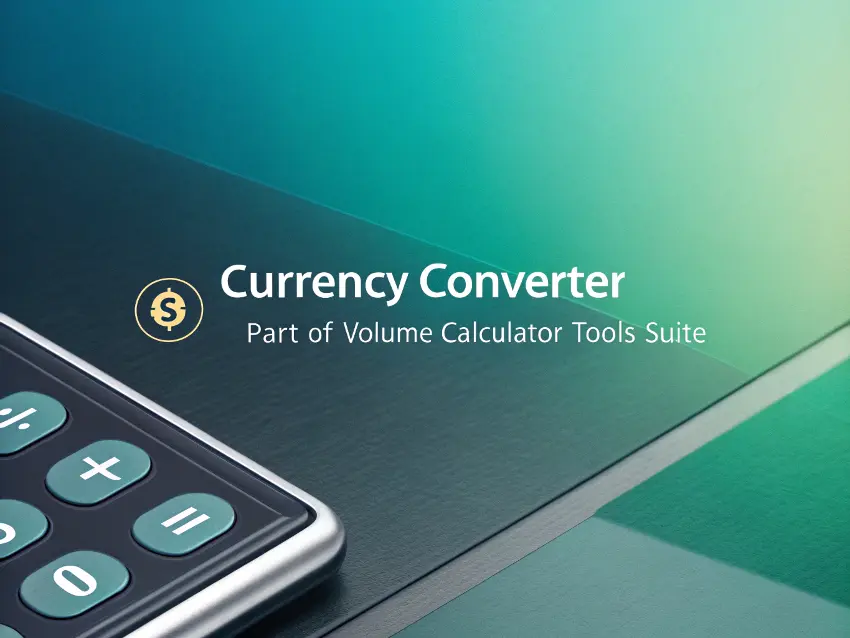Currency Converter
Convert between world currencies at current exchange rates

Currency Exchange Calculator
About Currency Conversion:
Currency conversion allows you to determine the equivalent value of money between different countries' currencies. Exchange rates fluctuate constantly based on global economic factors, central bank policies, and market forces.
This calculator uses indicative exchange rates for demonstration purposes. In real financial transactions, rates might differ slightly depending on the service provider, transaction fees, and market conditions.
Currency Exchange Tips
- Compare providers: Banks, money transfer services, and credit cards often have different rates and fees
- Watch for fees: Look beyond the exchange rate to the total cost including transaction or service fees
- Avoid airport exchanges: These typically offer less favorable rates than alternatives
- Local currency advantage: In most countries, paying in local currency is more economical than in your home currency
- Rate lock services: For future travels, consider services that let you lock in favorable exchange rates
Exchange Rate Factors:
Interest Rates
When a country raises interest rates, its currency typically strengthens as foreign investors seek higher returns.
Inflation
Countries with consistently lower inflation rates exhibit rising currency values as their purchasing power increases.
Political Stability
Stable political environments attract foreign investment, strengthening the local currency.
Economic Performance
Strong economic indicators like GDP growth and employment typically boost currency values.
Trade Balance
Countries with trade surpluses often see currency appreciation as demand for their exports drives currency demand.
Note: Exchange rates shown are for informational purposes only and may not reflect current market rates. For actual transactions, please consult financial institutions or currency exchange services.
Convert Currency
100.00🇺🇸USD=0.00🇪🇺EUR
1 USD = 0.0000 EUR
30-Day Exchange Rate Trend
Understanding Currency Exchange
Types of Exchange Rates
Spot Rate
The current market rate for immediately exchanging one currency for another. This is what most travelers and small transactions use.
Forward Rate
A predetermined rate for exchanging currencies at a future date, used to hedge against exchange rate fluctuations in business transactions.
Fixed Rate
Some currencies are pegged to another currency or basket of currencies by their governments, rather than floating freely in the market.
Retail Rate
The rate offered to consumers by banks and exchange services, which includes a markup over the interbank rates used by financial institutions.
Currency Exchange Costs
1
Exchange Rate Margin
The difference between the interbank rate (what banks charge each other) and the retail rate offered to customers. This is often hidden in the exchange rate itself.
2
Fixed Fees
Many services charge a flat fee per transaction, which can make larger exchanges more economical than multiple small ones.
3
Credit Card Foreign Transaction Fees
Many credit cards charge an additional 1-3% on purchases made in foreign currencies.
4
ATM Fees
Withdrawing cash abroad may incur ATM fees from both your bank and the local bank, in addition to currency conversion costs.
5
Dynamic Currency Conversion (DCC)
When merchants offer to charge your card in your home currency instead of the local currency, they typically use an unfavorable exchange rate.
Frequently Asked Questions
What's the best way to exchange currency when traveling?
For most travelers, using a debit card at ATMs in your destination country often provides the best combination of convenience and favorable rates. Credit cards with no foreign transaction fees are good for larger purchases. Avoid airport currency exchanges and exchanging all your money at once.
Why do different exchange services offer different rates?
Exchange rates vary because each provider applies different profit margins, fees, and operational costs. Banks typically offer less competitive rates than specialized forex services. The "real" exchange rate (interbank rate) is what banks use to trade with each other and is not directly available to consumers.
What is Dynamic Currency Conversion (DCC) and should I use it?
DCC allows you to see the transaction amount in your home currency at the point of sale while abroad. This service almost always uses a poor exchange rate, adding a markup of 3-7%. When given the option, choose to pay in the local currency and let your bank handle the conversion.
How often do exchange rates change?
Foreign exchange markets operate 24 hours a day during the week, and rates can change by the second in response to global events, economic data, and market trading. Consumer-facing rates typically update daily or multiple times per day, depending on the provider.